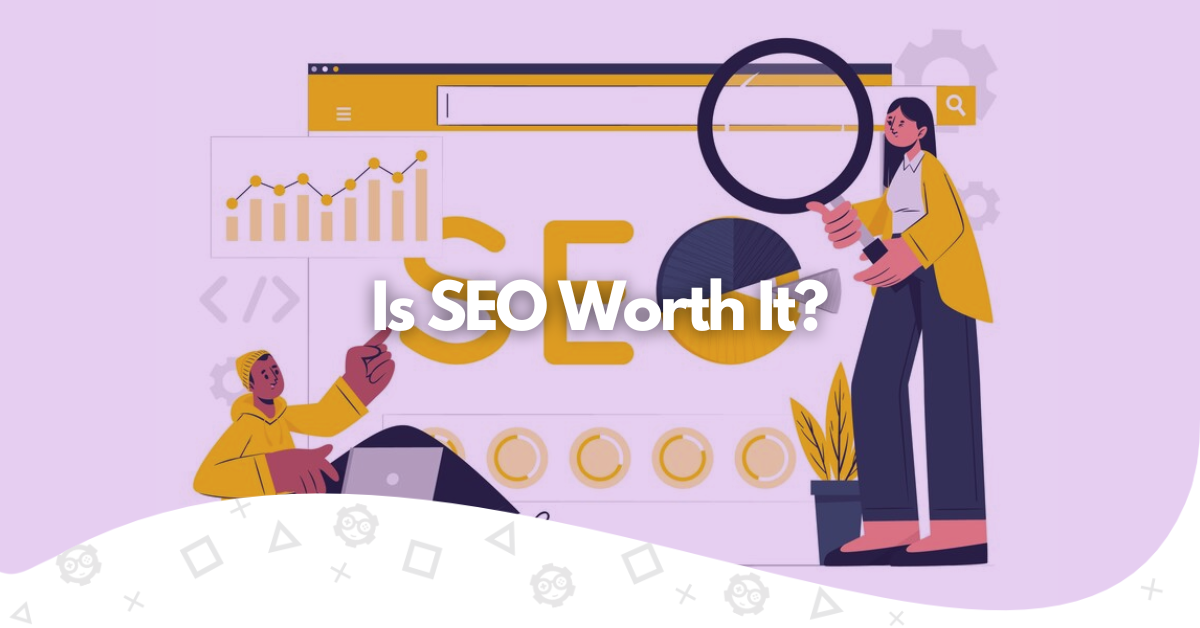Is SEO worth your money in 2024? SEO remains a top choice for increasing your brand’s online presence and attracting new customers.
Even though some say SEO takes too much time and money, 80% of CMOs plan to keep or boost their SEO spending this year. Many view SEO as smarter than paid ads because it can bring in just as much traffic without the hefty price tag.
The trick is ensuring your content speaks to your audience’s needs. High-quality content and excellent online experience are crucial to doing well in SEO.
So, in this article, we’re clearing up any confusion about SEO and giving you the facts to show why SEO is worth it.
What Is SEO?
Search Engine Optimization (SEO) is a straightforward concept about making your online content easy to find on search engines, particularly Google.
SEO involves a series of steps that digital marketers use to improve the content, helping it to appear more prominently on search engines. The goal is to rank the content higher in search results than the competition’s content.
But SEO is more than just using the right keywords. It’s about enhancing the quality and credibility of your content. It also involves improving the experience for your audience when they visit your website.
SEO is not about misleading people with catchy but irrelevant titles that don’t match your content. Also, SEO isn’t about stuffing your content with many keywords.
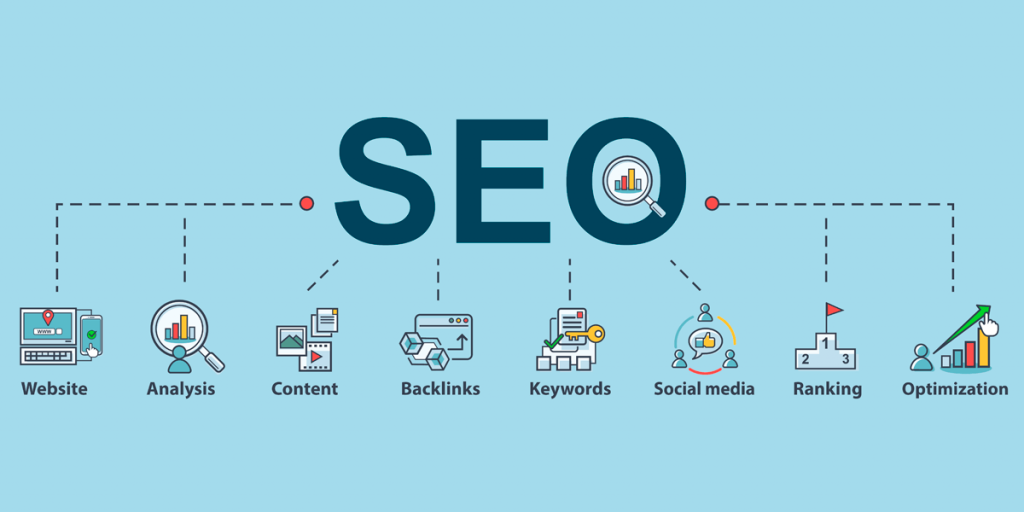
Why is SEO Really Worth It?
This is a common question among digital marketers and businesses when it comes to enhancing their marketing efforts.
Why should you invest in SEO? For example, unlike paid ads, SEO offers sustainable growth in organic search rankings.
Let’s delve into the most important reasons why SEO is worth it.
1. To Attract Qualified Traffic
SEO is essential for enhancing website traffic by attracting the right target audience to your web page. This approach is achieved through these strategies:
- SEO focuses on utilizing long-tail keywords instead of short-tail ones. It ensures that the traffic coming to your site is high in volume, relevance, and quality just by using these long keyword phrases.
- SEO targets search terms and queries directly relevant to your target audience rather than casting a wide net over the general market. This targeted approach means that your website content is designed to meet the topic needs of your audience.
The effectiveness of SEO also lies in its cost-efficiency, especially when compared to PPC advertising strategies used on platforms like Google Ads or Facebook Ads. The average cost for each click in PPC advertising is approximately $2.59. While pay-per-click can drive traffic to your website, SEO offers a more sustainable method.
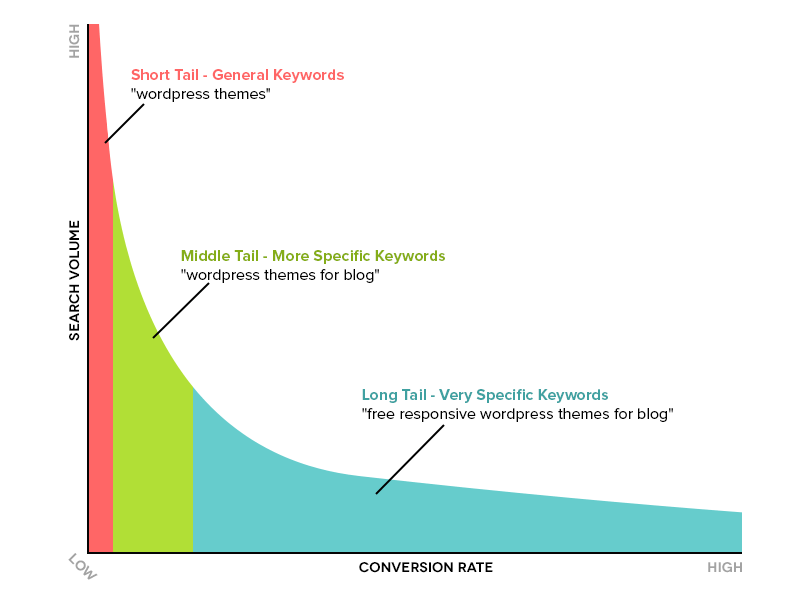
2. To Build Brand Awareness
SEO is an excellent tool for enhancing the recognition of your brand, products, and services. Let’s delve into how it works:
- With SEO, you naturally draw attention by crafting content that addresses common queries, such as a video game’s unique features. This approach highlights what you offer in a way that resonates with potential customers’ needs and interests.
- You can use backlinks from reputable websites to increase your brand’s visibility and credibility. When well-known sites link to your content, it’s a sign that your brand is recognized and trusted.
- SEO helps your brand to optimize the content for voice searches. Nowadays, people often use voice search for immediate needs like searching for “What Is Gamification.” Your brand can become part of people’s daily conversations and searches by optimizing for these queries, further enhancing visibility.
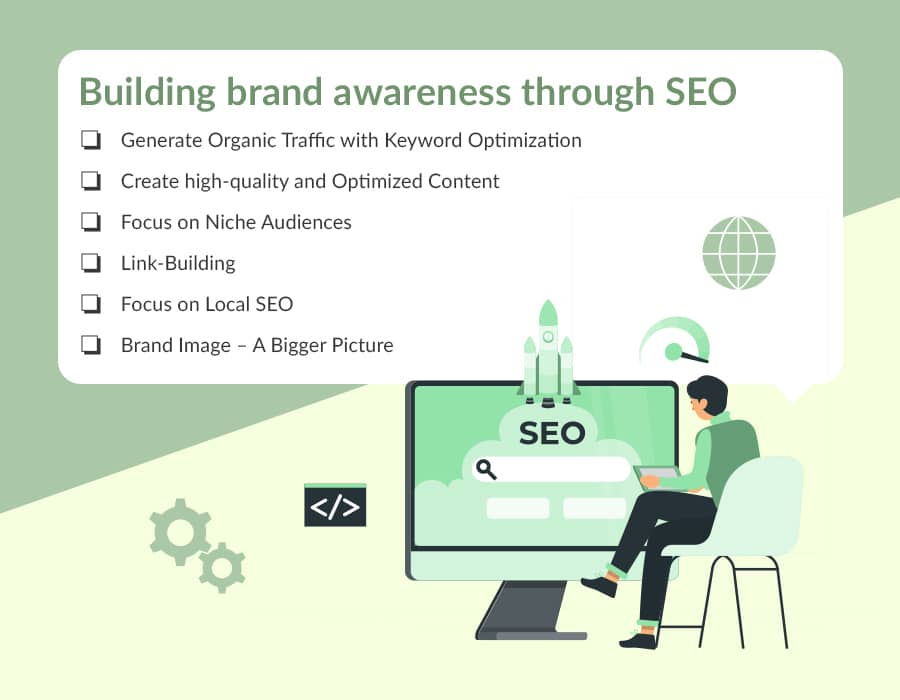
3. To Guide and Encourage Consumers
All potential customers have their ‘client buying process,’ so SEO helps guide them through their buying journey, which includes the following stages:
- Awareness.
- Consideration.
- Decision.
- Purchase.
- Post-Purchases.
Your business connects with visitors at any stage by creating SEO-friendly content, whether they’re starting to look for solutions or are already using your product or service. With SEO, you help them move through the sales funnel steps.
For instance, imagine someone looking for information on how to create a mobile game, including the design, time, and costs. If your website has SEO-optimized content that addresses these topics, you can effectively answer their queries. This not only helps in providing valuable information but also increases the likelihood of them becoming your customers.
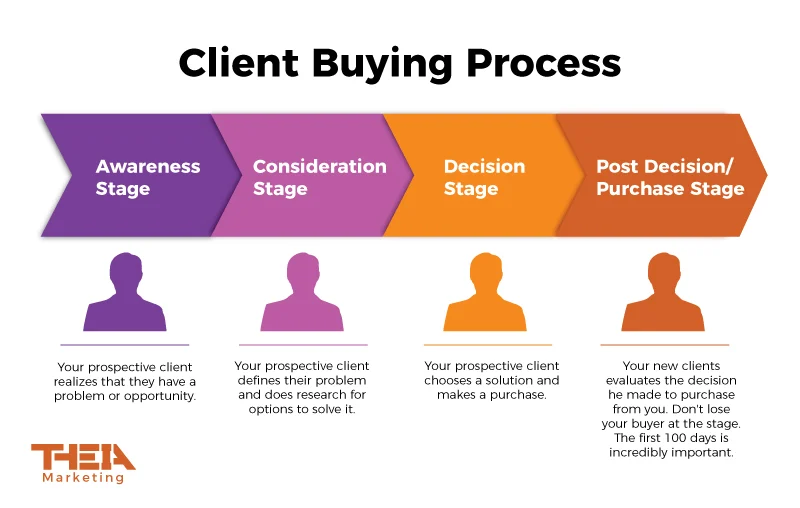
4. To Drive Leads and Sales
For years, SEO has been a reliable tool for generating leads and increasing sales, which is why many businesses invest in it. It builds brand awareness, drives qualified traffic, and guides your business toward purchasing.
This is achieved by combining search engine optimization with conversion rate optimization (CRO). For instance, when you create SEO content for a product page, you also incorporate CRO elements. This includes designing the page effectively, using compelling calls to action, and adding visuals that make buying your product simple and more attractive to customers.
The combination of SEO and CRO enhances search engine rankings, making it a powerful strategy if you’re looking to increase your leads and sales.
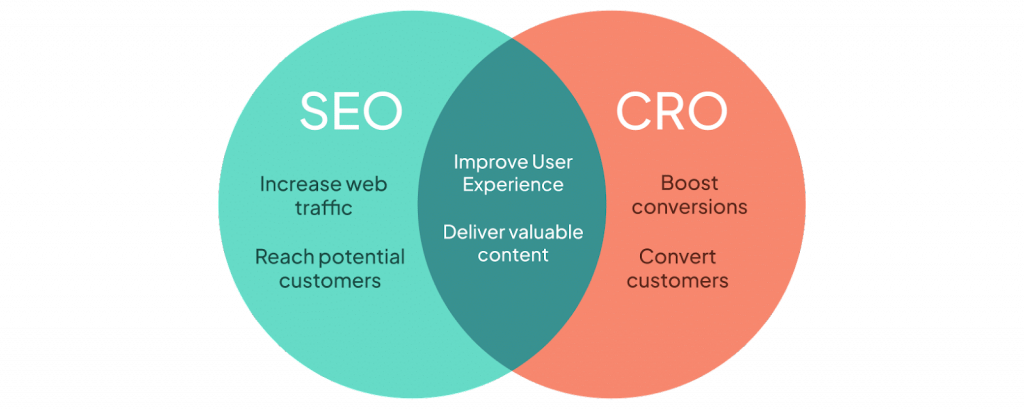
How SEO Has Changed Over Time
SEO has transformed significantly over the years. A decade ago, the SEO industry was like the Wild West – less regulated and full of varied, sometimes unsuitable methods. Today, it has evolved into a well-defined field crucial for business success.
In the past, the focus wasn’t always on quality, but modern SEO efforts prioritize high-quality content and providing answers to user queries. This shift has made the SEO service more effective and relevant for businesses.
Let’s delve into SEO’s most important evolution aspects and how they can impact your business and SEO needs.
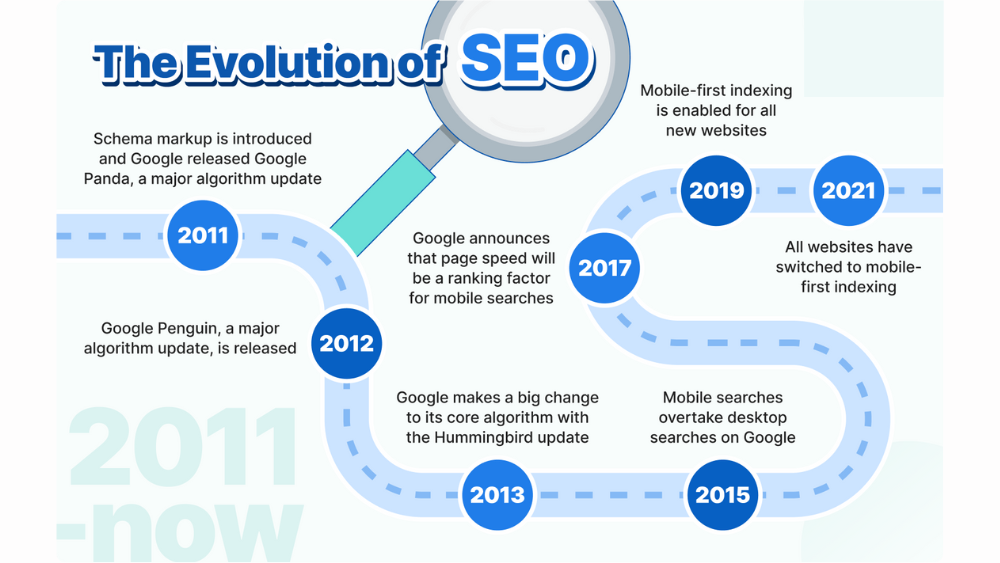
High-Quality Content
“Content is king” is a common saying in the SEO world, and it’s true. Creating content, whether a blog post, images, or videos, significantly boosts a website’s SEO and visibility in search results. Good content remains a significant factor in enhancing web presence.
However, the approach has changed drastically over the last decade. Earlier, practices like keyword stuffing were common, making SEO seem more like a game. But in 2011, Google’s Panda update revolutionized how SEO works.
This algorithm update penalized sites with low-quality content, shifting the focus to creating genuine, high-quality content. This change was significant for anyone looking to improve their web visibility in organic search results, emphasizing the need to create content that truly adds value.
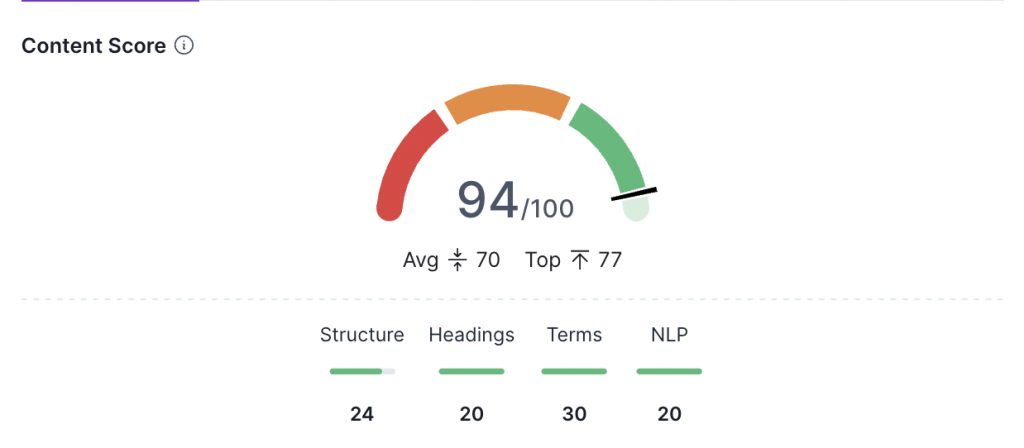
No More Linking Schemes
The days of linking schemes in SEO are gone. Various tactics like link wheels and black-hat links were common in the past. These spam-based linking strategies were used to manipulate organic rankings.
Everything changed with Google’s 2012 “Penguin” update. This significant change and several smaller updates targeted and penalized these dubious linking practices. Google’s crackdown in the late 2000s and early 2010s shifted the focus to natural linking and guest posts that genuinely enhance a site’s authority.
Today, these are the only links that positively impact organic rankings over time.
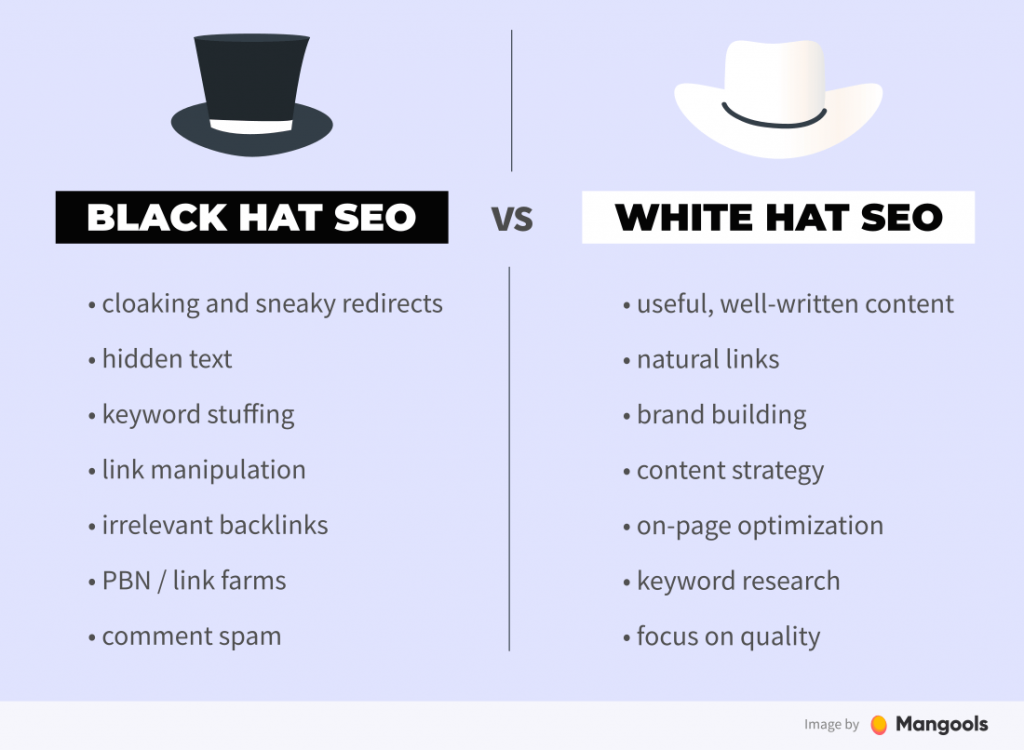
No More Keyword Stuffing
Keyword stuffing was once a common tactic to unfairly boost keyword rankings on Google’s search results page, but it is now a thing of the past. This practice involved gathering as many keywords as possible into meta tags, content, or anchor text.
By recognizing this issue, Google ended this strategy with the Panda update. Today, the role of keywords has evolved significantly. They’re no longer just about single words or phrases, instead, their meanings and the concepts they represent are what truly matter in SEO.
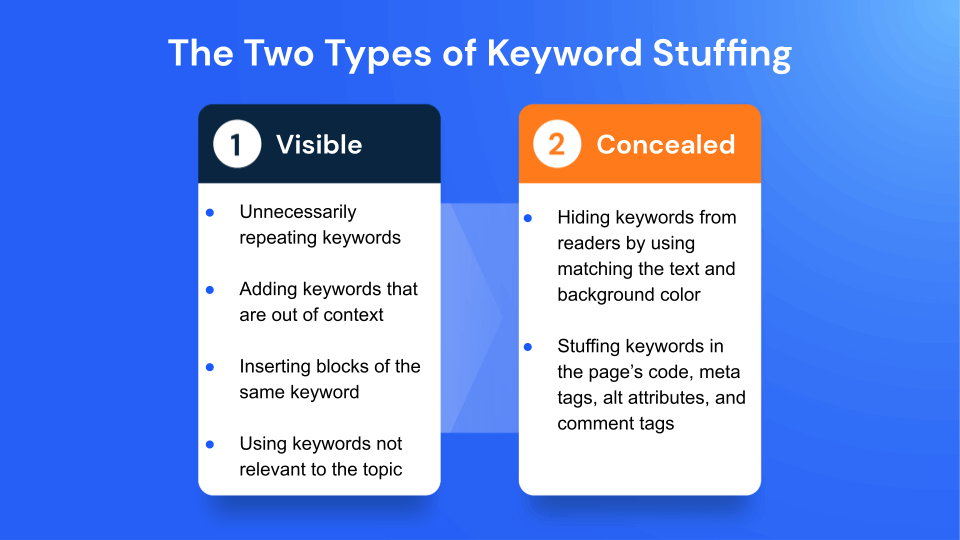
SERPs Changes
Search engine results pages (SERPs) have also changed over time. While many updates have been small, there have been some big changes. If you compare a SERP from 2009 to today, you’ll notice a huge difference in how they look and work.
Local Changes
Local SEO, crucial for both small and large businesses, has seen significant changes, especially in how it affects search engine results on Google search. The updates Google has introduced include layout changes like the local carousel and the well-known familiar three-pack layout.
The most impactful change came in 2014 with the “Pigeon” update. It blended traditional web ranking signals into Google’s algorithm, enhancing the visibility of sites with authoritative search terms. It made local searchers more frequent and effective, greatly benefiting businesses that had optimized their websites for local SEO.

Knowledge Graph
The Knowledge Graph, launched in 2012, is an excellent feature for answering queries entered in Google’s search bar. It answers simple questions, often appearing above organic search results for straightforward queries.
For those optimizing websites, it’s essential to focus on keywords likely to yield answers in the Knowledge Graph and understand which queries will lead to organic results featuring your pages. This means considering “answerable” keywords and using micro-formatting effectively.
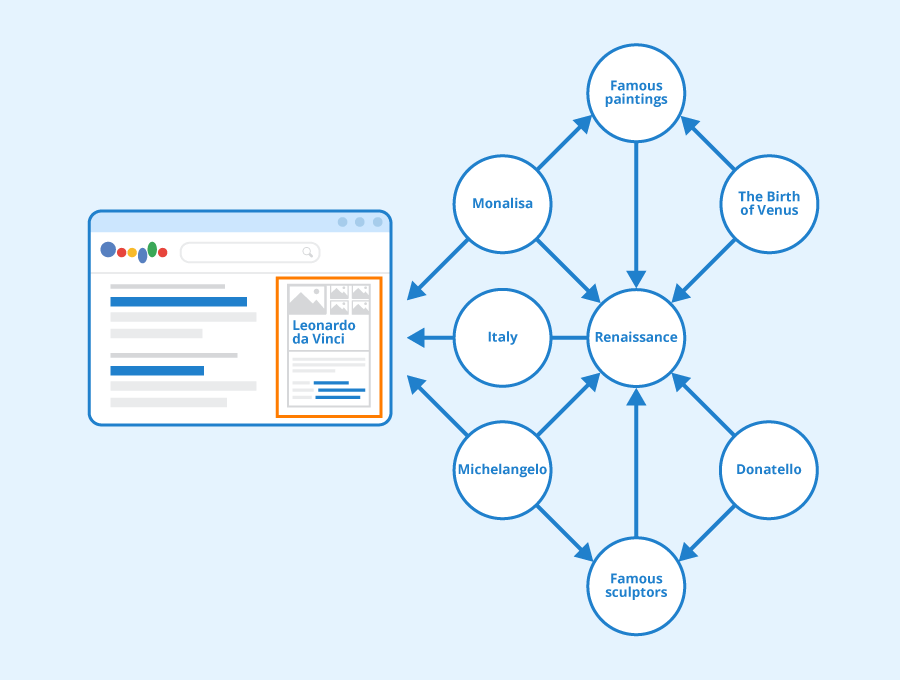
Mobile Improvements
The rise of mobile optimization marks one of the biggest shifts in search engine optimization. Since the iPhone’s debut in 2007, mobile usage has become a key focus in SEO strategies.
By 2015, mobile searches on Google surpassed desktop queries. SEO experts had to adapt, ensuring websites were mobile-responsive and fast-loading and offering a smooth user experience across all devices.
SEO vs. Traditional Marketing
Online Marketing, including SEO, is more cost-effective than traditional marketing. While traditional methods like print and TV ads are expensive and less targeted, SEO is cheaper and more precise.
SEO stands out for its ability to track and analyze performance. Its providers use analytics to monitor metrics like traffic sources and conversion rates, helping you to understand where your best customers come from. This data-driven approach makes SEO a powerful tool for targeting the right audience.
The pandemic in 2020 increased the usage of digital marketing, with many companies reallocating budgets from traditional to online channels. SEO, in particular, offers a high conversion rate and multiple customer touchpoints, from ads to social media, making it a key component of modern marketing strategies. SEO’s average conversion rate is 2.4%, compared to 1.7% for traditional marketing.
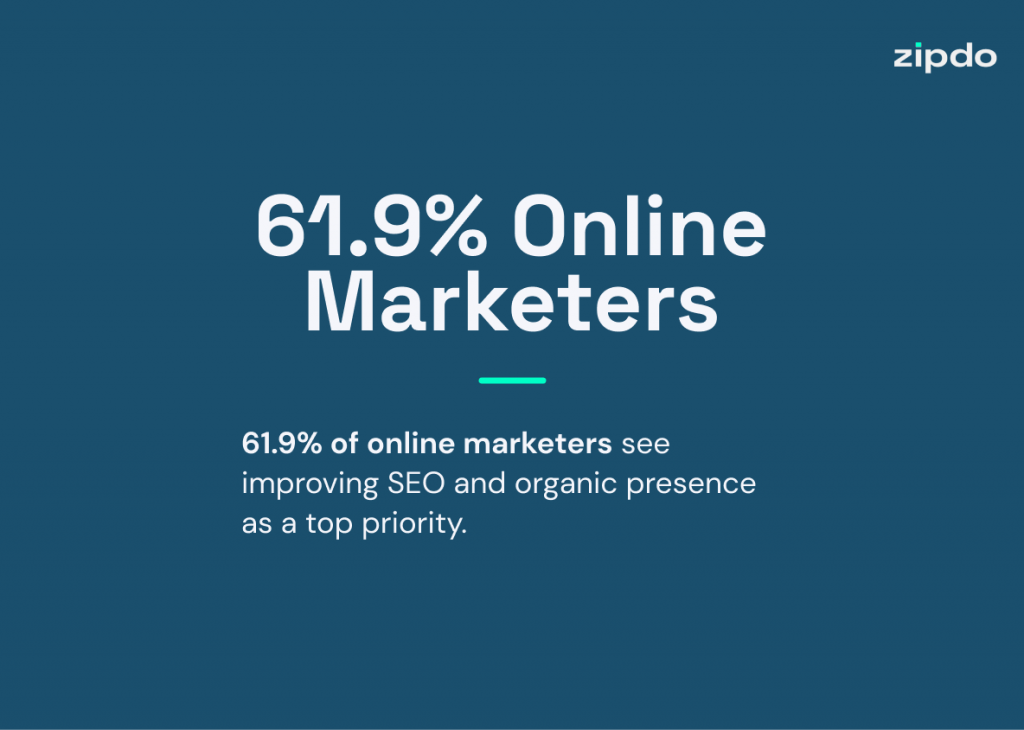
Reasons Companies Question SEO’s Worth
Although the benefits of SEO services are worth it, many business owners still need to work on embracing it due to several concerns. Here are the reasons why:
1. SEO Cost
SEO, like other digital marketing strategies, requires an investment, and some companies think it’s expensive but don’t consider the benefits that come with it.
You might be wondering how much SEO costs. As a business owner, you have a few options for investing in SEO, each with its cost implication.
- Hiring an Agency: This route is the better option for your business to increase traffic and leads and is affordable for all types of businesses. The main advantage is that you don’t need to learn SEO and can start quickly. Paid SEO services from an agency offer expertise and speed.
- Building a Team or Outsourcing: You might need to hire SEO consultants, freelancers, and an in-house SEO specialist. This might be an expensive route, but your business will receive greater results. This approach requires a good understanding of SEO and time commitment for hiring and onboarding.
- Doing it yourself: This is the least expensive option, but it demands time and skill. It’s a viable choice for small or local businesses with limited marketing budgets, but learning and implementing effective SEO strategies requires many hours of investment.
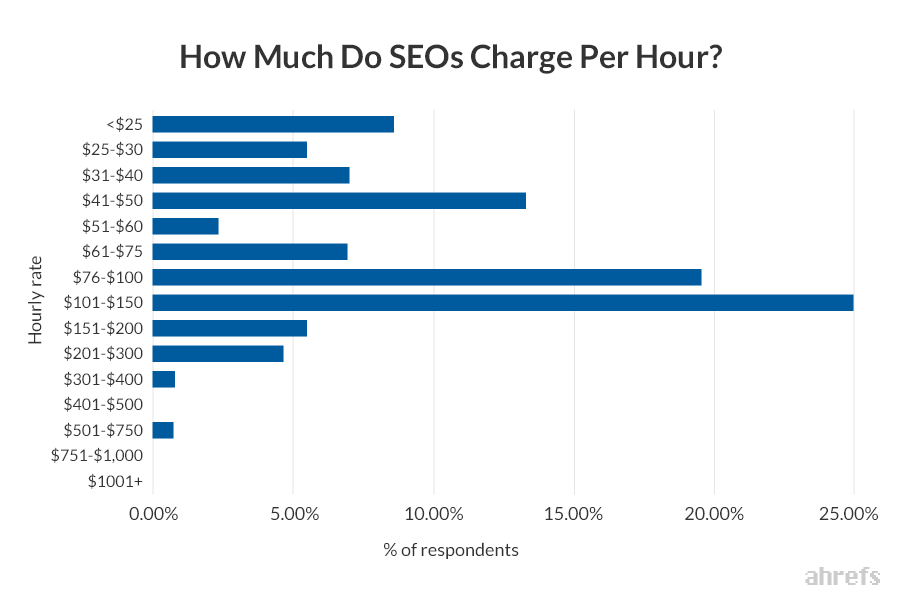
2. Return On Investment Time
Businesses often hesitate to pay for SEO due to concerns about the time it takes to see results. Typically, SEO can take three to six months, and sometimes even six to twelve months, to start delivering a return on investment (ROI).
However, the benefit of SEO is that once it begins to yield results, it works continuously, day and night. Unlike paid strategies like PPC, which require constant funding to maintain ROI, SEO drives traffic and sales long after your content is published and ranked.
This ongoing effect means that, while it may take time to see initial SEO results, the long-term benefits can be substantial and enduring for your business.
3. Requirements
Many business owners aim to do their SEO work, but this comes with some knowledge requirements. SEO success demands a mix of skills, such as:
- SEO expertise.
- Writing ability.
- Web development knowledge.
While some companies are well-versed in these areas, they often must collaborate with specialists like a web designer, which might be the most complex skill.
If you hesitate about investing in SEO but still need these skill sets, team up with a full-service SEO agency. This is the smartest solution for the success of your business.
SEO Successful Examples
If you’re not convinced yet, let’s check out these three examples that showcase the power of SEO.
1. Apple – Keywords and Pictures
A good SEO example is Apple, which uses the right words and pictures to show off its products online. They pick the best keywords so Google and people can easily understand what they’re selling, enhancing its brand authority.
Their descriptions are short and straightforward, but they tell you everything you need to know. Plus, their pictures make their website look exciting and easy to navigate.
This intelligent mix makes Apple stand out on search pages and draws people in, even before they decide to buy something. Try using Apple’s way on your site to help it climb the search rankings.

2. Semrush – Fast Loading and Smart Keywords
Semrush, a big digital marketing name, knows how to do SEO right. They’re experts in using keywords, showcasing the main one in the title, the main text, and even the web address. Additionally, their pages load super fast, making sure visitors don’t wait too long, which can increase the bouncing rate.
This smart SEO strategy helps Semrush drive more organic traffic and smoothly guide customers’ buying journey.
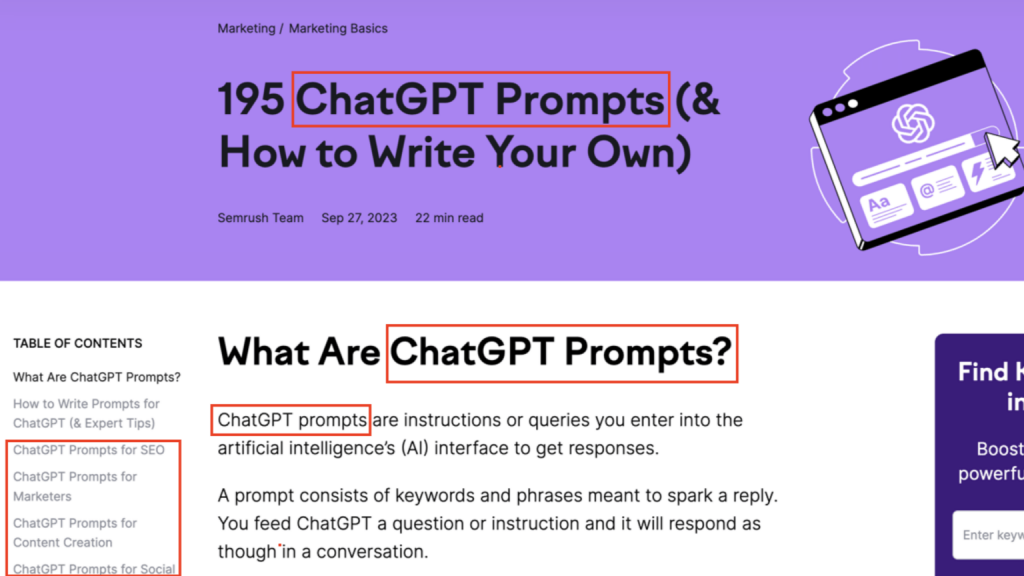
3. Venngage – Content and Long-Tail Keywords
Venngage, an infographic website, has made its mark on SERPs with its compelling content. Their commitment to quality enhanced their online visibility and positioned them as a leader in their field.
For example, the guide “What is an infographic?” stands out for its performance in Google, consistently appearing at the top results thanks to the use of relevant long-tail keywords like “infographic examples” and “infographic definition,” attracting thousands of searches every month.
This high-ranking guide serves a dual purpose for Venngage. While it directly educates readers about infographics, it also subtly introduces their services to a broader audience. Not every reader will need an infographic immediately, but the informative content lays the groundwork for a lasting relationship.

So, Is SEO Worth It In 2024?
Is investing in SEO worthwhile? Absolutely.
If there are potential customers online searching for your products, services, or solutions to issues you can address, then SEO remains an invaluable tool.
Since its inception in 1997, SEO has been a controversial topic among digital marketers. Still, it’s a solid strategy to generate awareness, draw more visitors, and secure high-quality leads, ultimately offering a superior return on investment for your marketing efforts over time.
We firmly believe in SEO effectiveness in 2024. But now the question is: Are SEO companies worth it?
Our experience has repeatedly shown how a well-crafted SEO strategy, avoiding outdated SEO tactics and optimizing content for search results, plays a crucial role in achieving marketing objectives. This is why marketers actively invest in SEO, partnering with reputable SEO agencies despite the costs involved and recognizing the long-term value it brings to their online presence.
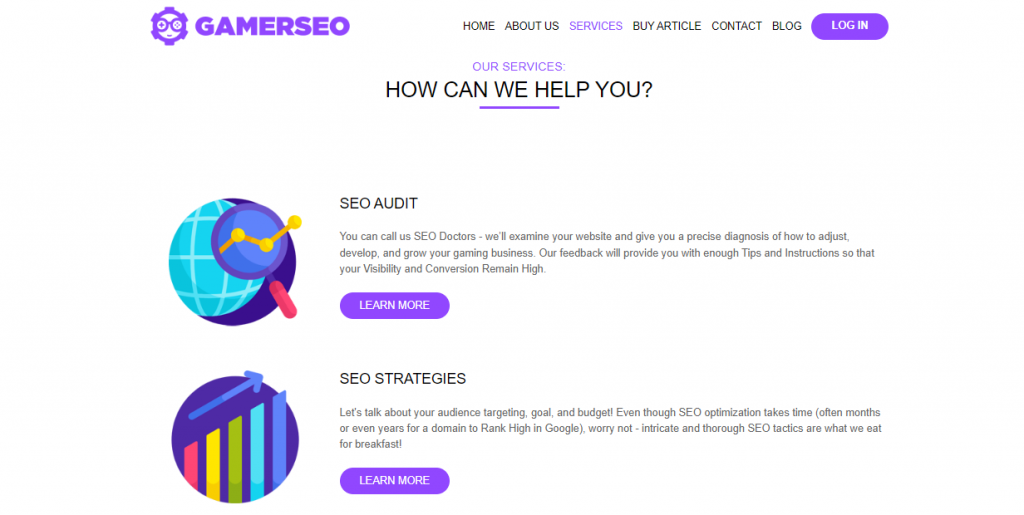
Make SEO Worth It For Your Business With Our Experts
Unlock the full potential of SEO for your business, whether you’re a local startup, a mid-sized enterprise, or a large corporation. Implementing SEO in your business as a core marketing strategy can significantly boost your revenue.
SEO is worth integrating into every stage of your marketing funnel, from attracting potential customers to guiding them through their customer journey.
Contact us if you’re searching for a reliable SEO provider to craft, execute, and oversee your SEO initiatives. Our SEO experts are ready to propel your business to new heights by making SEO a valuable asset in your marketing arsenal.

SEO enthusiast and digital marketing strategist. My expertise lies in optimizing websites for organic traffic growth and search engine visibility. I carry out, among others, SEO tests, keyword research and analytical activities using Google Analytics. Privately, he is a lover of mountains and bicycle trips.

